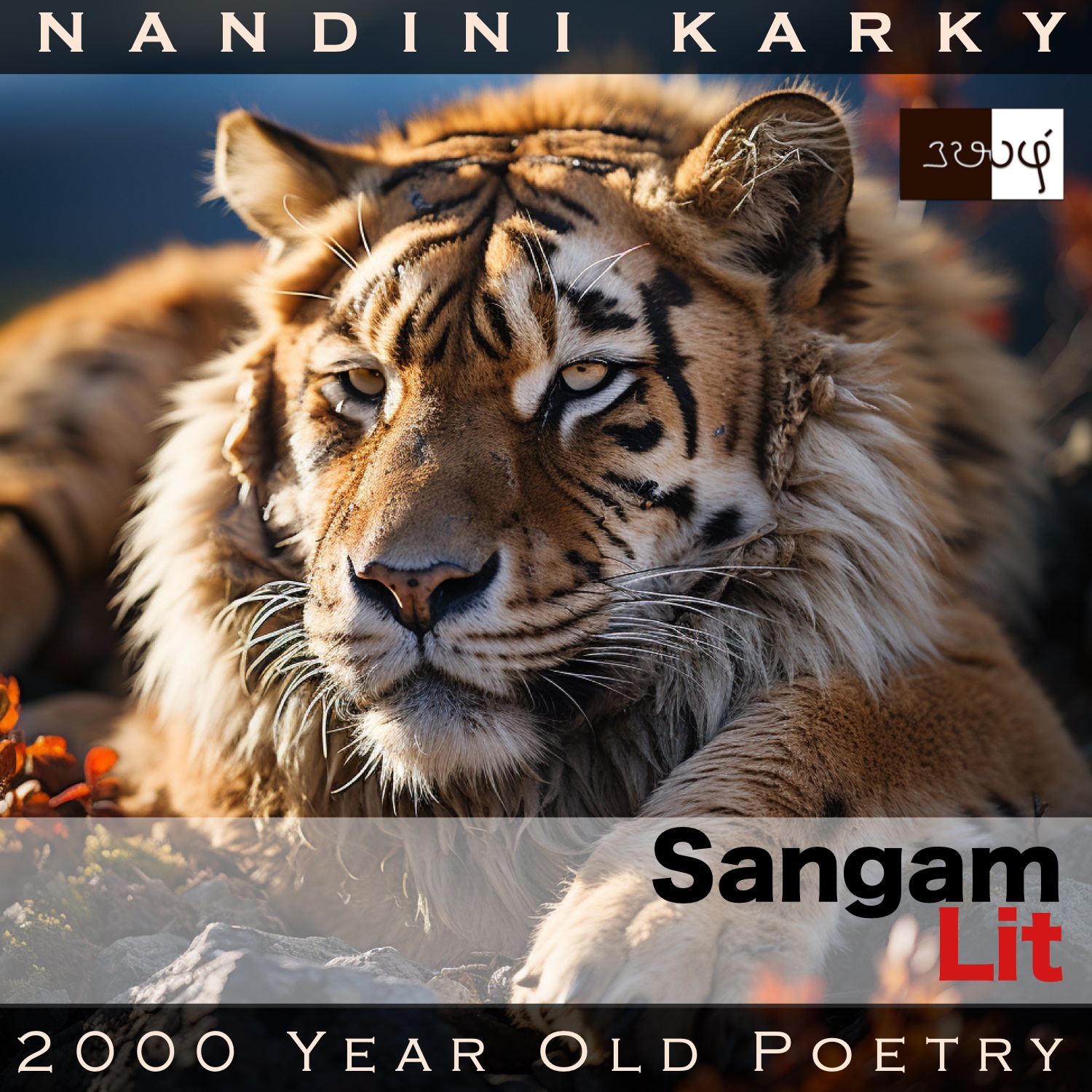Podcast: Play in new window | Download
Subscribe: Apple Podcasts | Spotify | Amazon Music | Android | iHeartRadio | TuneIn | RSS | More
In this episode, we perceive a unique way of expressing disappointment, as depicted in Sangam Literary work, Puranaanooru 202, penned to the Velir King Irungkovel by the poet Kabilar. The verse is situated in the category of ‘Paadaan Thinai’ or ‘Praise’ and sketches vividly the reaction of a poet to a king’s unrelenting attitude.

வெட்சிக் கானத்து வேட்டுவர் ஆட்ட,
கட்சி காணாக் கடமா நல் ஏறு
கடறு மணி கிளர, சிதறு பொன் மிளிர,
கடிய கதழும் நெடு வரைப் படப்பை
வென்றி நிலைஇய விழுப் புகழ் ஒன்றி,
இரு பால் பெயரிய உரு கெழு மூதூர்,
கோடி பல அடுக்கிய பொருள் நுமக்கு உதவிய
நீடு நிலை அரையத்துக் கேடும் கேள், இனி:
நுந்தை தாயம் நிறைவுற எய்திய
ஒலியல் கண்ணிப் புலிகடி மாஅல்!
நும் போல் அறிவின் நுமருள் ஒருவன்
புகழ்ந்த செய்யுள் கழாஅத்தலையை
இகழ்ந்ததன் பயனே, இயல் தேர் அண்ணல்!
எவ்வி தொல் குடிப் படீஇயர், மற்று, ‘இவர்
கை வண் பாரி மகளிர்’ என்ற என்
தேற்றாப் புன்சொல் நோற்றிசின்; பெரும!
விடுத்தனென்; வெலீஇயர், நின் வேலே! அடுக்கத்து,
அரும்பு அற மலர்ந்த கருங் கால் வேங்கை
மாத் தகட்டு ஒள் வீ தாய துறுகல்
இரும் புலி வரிப் புறம் கடுக்கும்
பெருங் கல் வைப்பின் நாடு கிழவோயே!
In the last verse, we saw how having failed at the court of the Velir King Vichiko, the poet Kabilar approaches another Velir King Irungkovel, hoping to marry King Paari’s daughters to him. This Velir king too refuses to accept the poet’s offer of marriage. When the king expresses his refusal, the poet says these words to him:
“As the hunters chase it in the forests, filled with jungle flame flowers, finding no refuge, a sturdy wild bull runs speedily, stirring up radiant gems and scattering shining gold in the tall mountain town, with a lasting victory and unfading fame, having two names. That fine ancient town that rendered crores of wealth, that long lasting Araiyam fell to ruin too; Now, listen to the reason why!
O Pulikadimaal, adorned with a luminescent garland, the one who attained the prosperous inheritance of your father! One of your kin having an intelligence like yours insulted the famous wordsmith Kazhaathalai. And, that’s the reason why, O esteemed ruler with speedy chariots!
I said to you, “They are from the clan of Evvi, and the daughters of Paari, renowned for his generosity’. Please bear with those hurtful and useless words of mine! O lord, I take leave of you; May your spear be victorious! In the mountain ranges, the dark-trunked ‘vengai’ tree bursts open its buds and sheds its radiant flowers with huge petals on small boulders looking like the striped back of a huge tiger. Such is the huge mountains in your land!”
Let’s unravel this intricate verse full of hidden meanings. The poet starts with an action scene in the wild where hunters are thunderingly giving chase to a wild bull. This wild bull looks around hoping to find some safe spot and finding none, it runs with all its might, and as it does, the gems in the land are revealed and the gold too is scattered around. What a wealthy land it must be, to have gems and gold spilling about, as a wild bull trods on it! True, says the poet, adding that this wild scene is happening in a famous mountain town that existed from ancient times, and was always victorious. He adds that this town was known by the name of Araiyam and was ruled by this king’s ancestors. It was one that yielded endless wealth to the rulers but one day it fell to great ruin. After telling this riches-to-rags story of a town, the poet asks this king, ‘Do you know why such a town of wealth and victory fell to ruin?’
Without waiting for an answer, the poet himself reveals to the king that this happened because a king who was kin to this king, whom the poet also describes as having the same smarts as this king Irugkovel, happened to insult a renowned poet ‘Kazhaathalai’. An embittered poet was the sole reason for the town’s downfall, Poet Kabilar explains. In those ominous words that the other king who brought destruction to his land was exactly like this king, the poet wields a sharp but subtle blow of insult to this king Irungkovel.
The poet also describes the king as having claimed the complete inheritance of his father and even though it may sound positive, the poet is yet again insulting the king for not earning his own wealth, but instead living off the legacy of his father. He talks about how he highlighted that the girls with him came from the great clan of Evvi and were the daughters of the famous Paari. ‘If those seemed hurtful, please bear with it’ says the poet in a seemingly self-deprecating way, but indirectly highlighting how the king seemed not to realise the worth of the poet’s words. Although disappointed, he takes leave of the king with a blessing that the king’s spear be victorious. Finally, the poet ends with a description of the king’s mountain country talking about how the fully bloomed Kino flowers there fall on boulders and seem like a fearsome tiger. That is no mere description, but a metaphor about how the offer of girls in marriage akin to the falling flowers seemed to the Velir king as a tiger – something to be feared.
Through this subtle metaphor, we understand why all these kings are continuously refusing Paari’s daughters in marriage and that’s because they were afraid of incurring the wrath of the three great rulers of the Tamil land – the Chera, Chozha and Pandya kings, who were responsible for King Paari’s demise! Through his brilliant skill in smithing words that express his emotions in being rejected without lowering his respectable stance, Poet Kabilar tells us the timeless truth that it’s not what happens to us, but how we react to it, that matters in the end!




Share your thoughts...